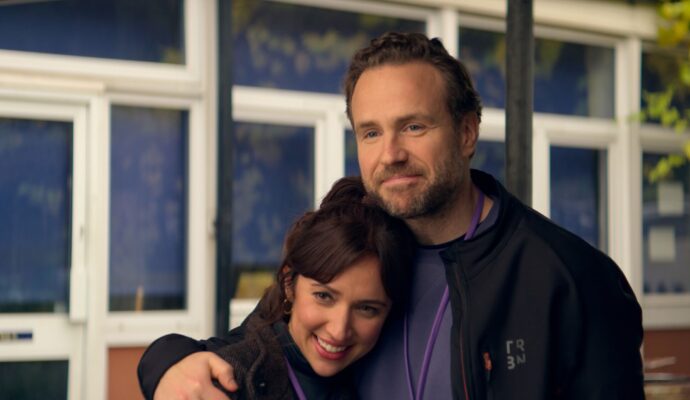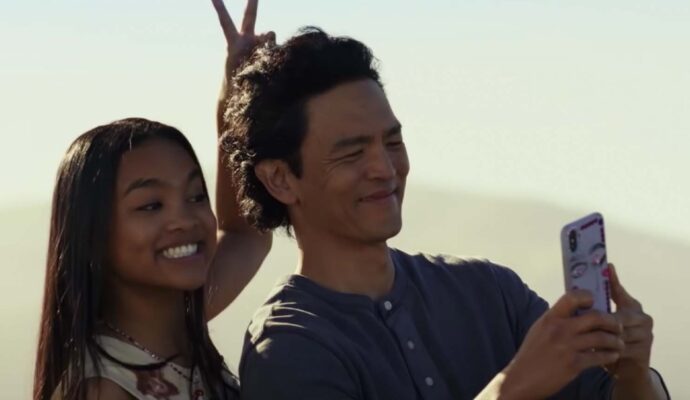Acclaimed director John Madden (“Shakespeare in Love” (1998), “The Debt” (2010), “The Best Exotic Marigold Hotel” (2011)) stopped in Phoenix on Nov. 17 to introduce his new film, “Miss Sloane” starring Jessica Chastain in the title role, for a Phoenix Film Society screening at the Harkins Scottsdale 101. I had a chance to sit down with him for a few minutes on that day as well, and Madden offered some wonderful insight about the title character, the reasons why Chastain was terrific for the part and more.
“Miss Sloane”, a thriller revolving around the U.S. gun lobbies, arrives in theatres on Friday, Dec. 9.
Q: You worked with Jessica on “The Debt” (2010), and she brought a steely, sober acumen to the table in that movie. In “Miss Sloane”, Elizabeth Sloane (Chastain) frequently rattles off a litany of concepts, facts and red tape dynamics at breakneck speed, like a CEO of a high tech company, and she is a very intimidating presence. What did you see in Jessica that made you think of her for this role?
JM: Jessica is one of a handful of actors who has that virtuoso kind of skill. She can do anything, as you know. She’s extremely smart and has a kind of effortless skill at what she does. You can’t see the wheels turning at all, and she internalizes what she does and inhabits what she does. She always has a vulnerability about her, a fragility about her, even when she’s playing a fiercely determined character like in “Zero Dark Thirty” (2012) or “The Martian” (2015).
So, I was under no doubt whatsoever that she could do that, and I also thought that she would absolutely be able to master the verbal dexterity that you are talking about. Not only do that, but do that with “a music” that meant that you weren’t just listening to a verbal assault and reeling from it. I heard a lot of the movie during (various) auditions, and you know what it can be like when you hear someone who hasn’t got “the music”.
It’s amazing what Jessica has pulled off. She dominates everything, but she makes everything so fascinating. It’s a highly verbal (film) – which is considered a danger zone for movies – but I always believed that you can make that thrilling, if you get it right and make it work right.
Q: The audience receives just a touch of insight into Elizabeth’s past. Did you have thoughts of revealing more of her past, or did you want to keep it a mystery?
JM: The (way that the) film is presented (is) actually a very deliberate choice. If you are telling, for example, a family drama or a character portrait that is bound up in the past and choices that were made in the past, that’s one thing. I think there is a kind of lazy orthodoxy that requires an event to be included in the story that illustrates how this person became this person.
This film is partly characterized as a thriller, obviously, and quite deliberately, and part of what you are doing is figuring out what is going on, and how and why it is going on. I felt, the writer (Jonathan Perera) felt and Jessica felt that the interesting experience is to watch that character and understand that character, as the story unfolds in a way that is sufficient to the story itself.
Q: It’s self-contained.
JM: It’s self-contained. You sort of know – instinctively – I think from the story, that she had to carve her own way through her life and her existence. Somewhere or another, she has compartmentalized or suppressed (her past), where she doesn’t allow it to become part of her normal discourse, her emotional life.
It’s true. (Any) circumstance where she allows any personal contact or intimacy is one which she holds the key to herself. It’s transactional. That person (who she meets in the film), the other half of that relationship, is constantly trying to mine her for information, which she won’t give. It felt to me that it was truthful to who the character was and what she was. I don’t come out of the movie – and I wouldn’t come out of the movie, had I not directed it – being frustrated by that. People become the way they are for a number of reasons, but it is not germane to this particular story as its own shape, its own weight and its own way of telling a story, I think.
Elizabeth has no friends. She has no relationships, outside of professional ones, and she is alone.
Q: Do you think that Elizabeth, after this film ends, would open up and find love?
JM: Yes, I think that she will open up in some way, because I think – (and) you don’t understand this in the beginning – but she stands over a colossal void.
She’s running herself into a hole that she’ll never be able to climb out of. She has nothing to live for actually, beyond the addictive charge of success and winning. She recognizes, I think, that it’s empty, and that is nothing to aspire to or to live by, but she couldn’t begin to know how to access the parts of herself that have somehow been cauterized, lost and forgotten.
Q: The film revolves around the gun lobby. How familiar were you with the inner workings of lobbies, lobbyist firms and/or the fight for and against gun restrictions coming into the project?
JM: One of the privileges of making movies is that you get to examine issues that you just have some intuitive sense of, but not a real understanding of. I didn’t know much more (about lobbyists other) than the job description. It’s an opaque thing to most people. I think that’s one of the pleasures of the film. The lid gets lifted on (lobbying firms) and how (they) work. Obviously, we are taking a very extreme example. I wouldn’t necessarily say that it represents all of that industry. That’s one thing.
The gun issue is one that I have been fascinated by from afar, because I am baffled by it. From an outside perspective, (after an incident like) the Sandy Hook massacre, why would anybody sensibly not wish to control the sale of firearms, without it necessarily violating their 2nd Amendment rights? Let’s (just) be careful about who is able to purchase these things. The fact that the majority of people believe in that, but it never becomes actual in a legislative sense, is a paradox or a scandal, depending upon which way you want to look at it.
It isn’t, (however), the subject of the film. The film is not a polemic, and I never intended it to be that. It’s the context of the film, but its political process is really the subject of the film, as well as the story of this character. The bafflement is a very good spur to moviemaking. How do I understand this, and how do I articulate its contradictions? The key to it is the (U.S.) Constitution, of course. Those of us outside need to (come) to grips and understand what the significance of it is – politically – in the country, and I respect that.




